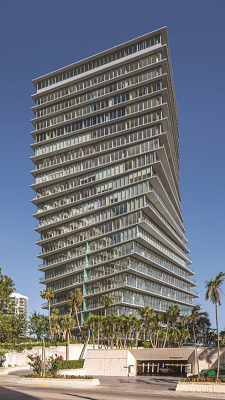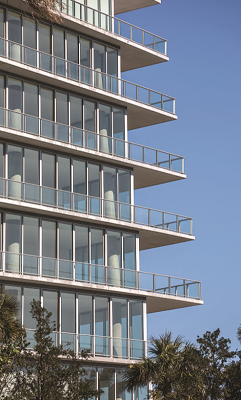A new beachfront condominium complex in Miami, Florida, USA, is utilizing a novel design and coatings system to provide superior resistance to corrosion and weathering.
Completed in 2016, the Grove at Grand Bay complex features two swiveling 20-story towers, each housing 49 upscale condominiums highlighted by expansive views of Biscayne Bay and its lush tropical surroundings. However, unique climate concerns to the region prompted an innovative concept from globally renowned architecture company Bjarke Ingels Group (Brooklyn, New York, USA).
Unique Design Considerations
 According to the architect, the reason for the twisted towers is to offer an ocean view and an expanded living space to all residences. According to the architect, this would not have been possible with two conventional rectangular towers, stacked one behind the other.
According to the architect, the reason for the twisted towers is to offer an ocean view and an expanded living space to all residences. According to the architect, this would not have been possible with two conventional rectangular towers, stacked one behind the other.
But the larger reason for the twists is to provide both buildings with ample protection against Miami's famously tropical weather, which combines daily exposure to corrosive and humid salt air with the perpetual summertime threat of hurricanes and tropical storms.
To protect against weathering, the architect and engineers designed each tower with diagonally slanted concrete columns reinforced with composite cores of concrete and steel internal plates for the shear walls.
Additional stability is provided through the use of camber floor plates, each of which arches slightly in relation to the floor below; hat-trusses for each roof, where girders are cantilevered from the tower cores and connected to the columns; and pressure-injected, auger-cast pilings that are driven, on average, 80 ft (24 m) into the soil.
Coil Coatings System
For the exterior, international coatings applicator Tecnoglass (Barranquilla, Colombia) engineered hurricane-resistant window walls, glass doors, and metal framing systems finished with Duranar fluoropolymer coil coatings from PPG (Pittsburgh, Pennsylvania, USA). This coatings system has been successfully tested in similar environments for more than 40 years, the manufacturer explains.
“This was a demanding application that required the use of the very best materials,” says Carlos Amin, vice president of sales for Tecnoglass, a member of PPG's certified applicator program.
“Our engineers designed 12-foot [3.7 m] floor-to-ceiling windows and sliding glass doors with three panes of coated, ultra-clear glass,” Amin explains. “The balcony railings were laminated with two [pieces] of the same glass. In addition to protecting the metal framing with coatings, we hermetically sealed everything at the factory and installed custom-made rollers on the doors to make sure they operated properly. Everything is hurricane-resistant and insulated.”
 Based on a 70% polyvinylidene fluoride (PVDF) formulation, Duranar coatings are thin, two-coat systems consisting of a corrosion-inhibitive primer and the fluoropolymer topcoat. According to the manufacturer, the coatings are extremely inert, offering long-term durability and resistance to chemical attack and surface damage caused by acidic rain, salt spray, and humidity encountered under normal tropical conditions. Besides the PVDF, the remaining 30% of the resin system is made with a proprietary resin formula from the manufacturer.
Based on a 70% polyvinylidene fluoride (PVDF) formulation, Duranar coatings are thin, two-coat systems consisting of a corrosion-inhibitive primer and the fluoropolymer topcoat. According to the manufacturer, the coatings are extremely inert, offering long-term durability and resistance to chemical attack and surface damage caused by acidic rain, salt spray, and humidity encountered under normal tropical conditions. Besides the PVDF, the remaining 30% of the resin system is made with a proprietary resin formula from the manufacturer.
For this project, the architect asked for white and silver color pigments to be added to the coatings to “harmonize with the glass,” the applicator explained. The manufacturer says its color pigments are not added to the coatings until they have been exposure tested under harsh conditions — such as those required for seacoast corrosion protection — for at least 10 years.
In all, more than 22 tons (44,000 lb) of coatings were used on the project, according to the applicator.
Resistant to Hurricane Irma
After the Grove at Grand Bay towers were complete in 2016, it only took one year before the system received a significant test. In September 2017, Hurricane Irma — packing 120 mi/h (193 km/h) winds and major storm surge — made landfall on Marco Island in South Florida, less than 100 mi (161 km) from Miami.
As expected, the storm brought heavy winds and tropical conditions to the condominium site. Even so, ownership officials with Terra Group (Coconut Grove, Florida, USA) say the towers came through the event relatively unscathed. “Overall, the two structures did extremely well — including the hurricane-impact glass,” says Jason Gilg, senior development manager.
Based on the success in Florida, the architect has since specified the coatings system for other high-profile projects on the U.S. East Coast, according to the manufacturer.
Source: PPG, www.ppgmetalcoatings.com.